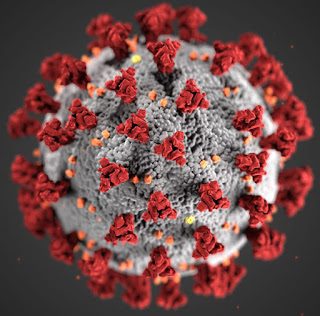Risk of Americans getting the new coronavirus (Covid-19) remains low, but a top expert cautions that this is an evolving situation

The new coronavirus, Covid-19 (Centers for Disease Control)
—–
By Melissa Patrick
Kentucky Health News
Kentucky health officials have been monitoring more than 100 people for the novel coronavirus, all of whom agreed to voluntary isolation after recent travel to mainland China, but as of Sunday there had been no confirmed cases in Kentucky.
The state has tested one person for the virus, and that test came back negative, Gov. Andy Beshear said at a Feb. 27 press conference. State public-health officials have offered a list of several steps you can take to protect yourself and those around you:
- Wash hands with soap and water for at least 20 seconds; only use alcohol-based hand sanitizer if soap and water are not available.
- Avoid touching your eyes, nose and mouth with unwashed hands.
- Avoid close contact with people who are sick.
- Stay home if you are sick.
- Cover your cough or sneeze with a tissue and then throw it away.
- Clean and disinfect frequently touched objects and surfaces.
- Get a flu shot.
Why get a flu shot when it won’t work against the coronavirus, which has been named Covid-19? The U.S. surgeon general says fewer flu patients equals more resources to combat Covid-19; and the Kentucky Medical Association says having the flu weakens the immune system, leaving unvaccinated people more susceptible to contracting other illnesses. In the great majority of Covid-19 deaths there has been an underlying medical condition.
On Saturday, the surgeon general concured, saying on Twitter that Americans should stop buying masks because They won’t prevent the general public from catching the virus, “but if health-care providers can’t get them to care for sick patients, it puts them and our communities at risk!”
Facts about the virus
Covid-19 is a respiratory illness that can spread from person to person. The CDC says it is transmitted by tiny droplets from sneezes and coughs and can spread to people as much as six feet away. And while it may be spread from contact with infected surfaces or objects, “this is not thought to be the main way the virus is spread,” the CDC says.
The virus was first identified in China. The CDC says it is not spreading throughout the United States. Two deaths from the virus were reported Saturday and Sunday in Washington state.
As of Feb. 29, the CDC reported there had been 22 confirmed and presumptive positive cases in the U.S., plus 47 confirmed positive cases among people who have been repatriated to the U.S.: three from Wuhan, China, and 44 from the Diamond Princess cruise ship, which had been docked in Yokohama, Japan.
The World Health Organization reported on Feb. 28 that there are more than 83,000 cases worldwide, with more than 2,800 deaths.
The risk of getting Covid-19 in the U.S. is currently low, but Dr. Anthony Fauci, the director of the National Institute of Allergy and Infectious Diseases, said at a White House press conference Saturday that it’s important to remember that “this is an evolving situation.”
Common signs and symptoms of Covid-19 include cough, other respiratory symptoms, fever, shortness of breath and breathing difficulty. Symptoms may appear in as few as two days or as long as 14 days after exposure.
Preliminary information shows that older people and people with underlying health conditions may be at increased risk for a severe case of the virus. Most cases of the virus are mild, but that is one thing that makes it harder to deal with.
An insidious disease
Because Covid-19 is generally not life-threatening, it is harder to identify and isolate, Dr. James Hamblin writes for The Atlantic: “It is deadly, but not too deadly. It makes people sick, but not in predictable, uniquely identifiable ways. Last week, 14 Americans tested positive on a cruise ship in Japan despite feeling fine. The new virus may be most dangerous because, it seems, it may sometimes cause no symptoms at all.”
Hamblin writes, “Testing people who are already extremely sick is an imperfect strategy if people can spread the virus without even feeling bad enough to stay home from work.”
That’s what happened to Carl Goldman, who got the virus while on the quarantined Diamond Princess.
Goldman, who is in his late 60s, tells his story in The Washington Post, writing that his only symptoms are that this chest feels tight and he has coughing spells. He writes that he has no chills, no body aches, breathes easily and has no stuffy nose.
“If I were at home with similar symptoms, I probably would have gone to work as usual,” he writes.
His treatment has largely been preventive IV care, “gallons and gallons of Gatorade, and when my fever rose just above 100 degrees, some ibuprofen. . . . It’s surreal to see everyone panic — news conferences, the stock market falling, school closures — about a disease I have. It does seem likely that coronavirus will spread in the United States, but it won’t help anybody if we all panic.”
Robert Redfield, the CDC director, said at Feb. 27 press conference, “At this stage, the risk is low we need to go on with our normal lives.”